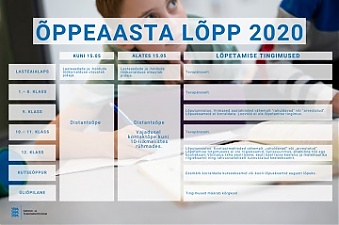Covid-19, Crisis, Education and Science, Estonia, Good for Business
International Internet Magazine. Baltic States news & analytics
Monday, 05.01.2026, 03:08
Covid-19: Estonia's education institutions allowed to start partial contact learning from May 15
 Print version
Print version |
|---|
Contact learning may resume in general education schools, vocational schools, universities, institutions for refresher and updating courses, hobby schools and open youth centers, spokespeople for the Ministry of Education and Research said.
Minister Mailis Reps said that the implementation of the proposal made to the government almost a month ago is now certain.
"Scientists have approved the gradual restoration of contact learning from mid-May," Reps said, adding that based on the forecasts the hope also has arisen that this year's graduation ceremonies can under certain conditions take place in the open air, not exclusively via video screens.
Reps said that in such case all the restrictions and rules valid for public meetings must be observed. Various smart solutions which provide an opportunity also for the relatives, friends and acquaintances of the graduates to participate in a graduation ceremony continue to occupy an important place. More precise guidelines concerning graduation ceremonies can be offered after it becomes clear what restrictions will be valid in June.
It will definitely not be possible to stage graduation ceremonies this year in the usual format that which brings together large crowds.
Starting from May 15, in-person learning may be organized on the premises of schools in smaller groups of up to 10 students plus the teacher or instructor. In the seating of students the 2+2 rule must be observed.
The restriction of no more than 10 students per room does not apply in the case of exams, including state examinations and professional examinations. Since exams can be held in bigger rooms, such as assembly halls, sports halls, bigger auditoriums, and spaces for practical training, more than 10 students can be allowed in an examination room provided that they are seated within the room dispersed.
Educational establishments must make sure that the protection of students belonging to at-risk groups, as well as of the people organizing the studies, is ensured. The manager of the educational institution must ensure sufficient disinfection of surfaces and items and the continuous ventilation of rooms. It is important for all participants in the activities -- students, other participants, and those conducting the studies -- to do their utmost to contain the spread of the infection, the minister added.
- 28.01.2022 BONO aims at a billion!
- 13.02.2021 Моя жизнь в газете. Очерки по новейшей истории Латвии. Глава 1
- 30.12.2020 Накануне 25-летия Балтийский курс/The Baltic Course уходит с рынка деловых СМИ
- 30.12.2020 On the verge of its 25th anniversary, The Baltic Course leaves business media market
- 30.12.2020 Business Education Plus предлагает анонсы бизнес-обучений в январе-феврале 2021 года
- 30.12.2020 Hotels showing strong interest in providing self-isolation service
- 30.12.2020 EU to buy additional 100 mln doses of coronavirus vaccine
- 30.12.2020 ЕС закупит 100 млн. дополнительных доз вакцины Biontech и Pfizer
- 29.12.2020 В Латвии вводят комендантский час, ЧС продлена до 7 февраля
- 29.12.2020 Latvia to impose curfew, state of emergency to be extended until February 7








 «The Baltic Course» Is Sold and Stays in Business!
«The Baltic Course» Is Sold and Stays in Business!

